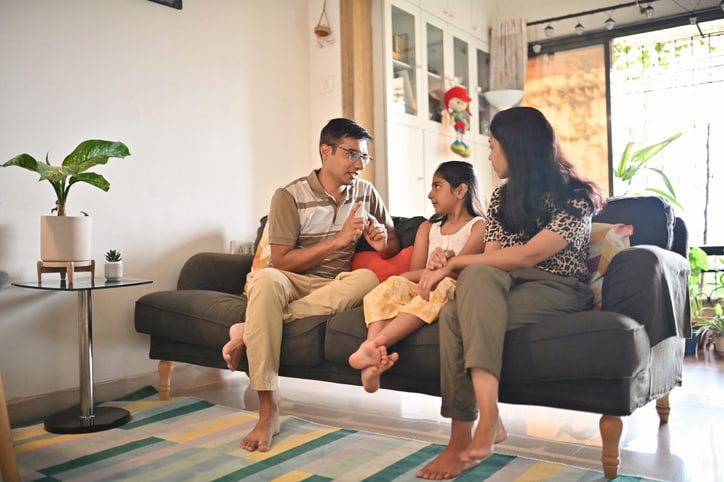When Keischa Pruden’s now 27-year-old son, Aaron, was first diagnosed with autism as a young child, information about the disorder was fairly minimal. “At the time, there wasn’t much support or information for autistic people or their families at the time.”
Fast-forward to today, Pruden is a licensed therapist and autism advocate and she wants the families she helps to have an easier time assimilating to an autism diagnosis than she did.
Dr. Richard Frye, a child neurologist and chief of neurodevelopmental disorders at Barrow Neurological Institute at Phoenix Children’s Hospital, agrees that for families with children who have autism, community and accessibility to educational resources is crucial.
“Caring for a child with autism spectrum disorder can be difficult and complicated,” says Frye. “In order to learn about the best way to care for your child and the local resources available, it is best to involve yourself with others in the community who can inform and support you.”
But what are the best resources for you personally? Here, Pruden, Frye and other experts share their top autism resources for parents and caregivers.
Autism advocacy groups
The National Autism Association
From educational resources to therapy and inspiration for autism fundraisers and community events, the National Autism Association’s website is a one-stop-shop for caregivers of children with autism.
Here are a handful of top features to look out for:
- Helpful resources to combat challenges unique to autism, including how to deal with bullies at school.
- First step toolkits to give parents and caregivers a step-by-step plan for dealing with an autism diagnosis.
Autism Society of America (ASA)
Jessica Myszak, a licensed child psychologist and director of The Help and Healing Center, often recommends the Autism Society of America (ASA) to families of clients who have recently been diagnosed with autism. “This long-standing organization has resources by topic, a blog and a national helpline that can help you connect to resources and services in your area,” she explains.
Emily Newton, a clinical psychologist and board certified behavior analyst at Springtide Child Development, a center that supports children with autism in Connecticut and Massachusetts, also recommends the ASA to families. Instead of focusing on the organization’s national reach, though, Newton advises looking to its local resources.
“I always recommend families join local organizations, such as local chapters of the Autism Society,” Newton says. “This allows for families to connect with those who live nearby and can discuss resources in their specific community.”
Some of ASA’s best features:
- Resources by topic, a convenient landing page that allows parents to search any service they need, including different types of therapies to employment options.
- Educational resources, including explainers on what autism is, how it’s diagnosed, and best forms of treatment.
- Legal resources, including up-to-date news on legislation regarding autism and ways to engage with local representatives.
Autistic Self Advocacy Network (ASAN)
Parenting or caring for a child with autism means doing everything within one’s power to ensure that child leads a healthy, fulfilling life. While a major component to that is education and understanding regarding the diagnosis, there’s also an advocacy perspective — pushing the world to be a better, more accepting place for autistic people. That’s the concept driving the Autistic Self Advocacy Network (ASAN).
“ASAN’s stance is strong, but they also offer information on why they feel the way they do,” explains Pruden, noting that you’ll find top-notch resources for those wishing to become stronger self-advocates for autism.
Here’s how ASAN helps parents of children with autism get involved and be stronger autism advocates:
- An easy-to-use interface for families with children who have autism on tracking local legislation, finding elected officials to speak to and ways to take action.
- Ways to get involved in the autism community, from volunteering for ASAN to joining an ASAN-affiliated local group.
- Educational tools and resources to help families navigate diagnosis and treatment.
Autism Housing Network (AHN)
The vast majority of resources for autistic individuals and their caregivers focuses on the younger set, but that doesn’t mean young adults and older folks with autism no longer need support. “Parents of autistic adults are very often searching for resources since support for this population drops off after age 21,” says Ann Carrick, communications manager at the Madison House Autism Foundation in Rockville, Maryland, an organization that focuses on older individuals with autism.
“We provide resources in various categories through the Autism Housing Network (AHN),” she continues. “Housing and related care support services are in huge demand due to the nationwide crisis of housing shortages and not enough care staff (thousands are on waitlists for housing and support services for years), so the AHN specifically focuses on being a hub for housing listings and resources for housing seekers and developers.”
Some of AHN’s best features:
- A housing guide, that offers tips, ledes and more for individuals with autism and other neurodiversities.
- A housing directory that shares existing and emerging housing models for the population.
- A “turning 18 checklist” that lists a number of suggestions for managing life as a legal adult.
Online tool for families navigating an autism diagnosis
Autism Navigator
Autism Navigator is just that — a multifaceted tool aimed at helping parents and caregivers navigate an autism diagnosis. It’s a resource that Myszack refers to her clients often. “This site has webinars, resources, a virtual community, courses and books for families along with a collection of videos and information for families who are exploring the possibility of a diagnosis,” she explains.
Here’s what else you’ll find within Autism Navigator:
- Detailed autism glossaries and educational guides to help parents and caregivers make sense of a diagnosis and move forward with confidence.
- Free educational courses and webinars for caregivers and parents.
- A provider directory to help connect families with professionals who specialize in autism.
“At the end of the day, we all have a need to feel seen and supported in our daily lives.”
— Keischa Pruden, licensed therapist and autism advocate
Social networks for parents and caregivers of children who have autism
MyAutismTeam
For Emma Gordon, coming to terms with her now 9-year-old son David’s diagnosis was a challenge. “[The diagnosis] was a lot to take in, and it took me a year to fully accept that I was a parent to a child with special needs,” she recalls.
For Gordon, a key component in ensuring her son thrived was via community and support through MyAutismTeam. “I was able to meet with lots of parents of kids with autism through this social network,” she explains. “They understand every bit of your struggles making it easy for you to lean on them for support, get more information, helping hands and advice.”
Here are some of the most interacted with (and popular) features of the site, according to MyAutismTeam:
- An activity page detailing member updates, which include images, stories, thoughts and anecdotes where “daily triumphs and trials and shared and supported.”
- A “Find People Like You” locator tool to help connect users with other parents who have children of similar age diagnosed with autism.
- A detailed Q&A section where parents can find answers to other users’ top questions, in addition to space for new users to ask questions to MyAutismTeam directly.
Of all the experts we interviewed (including parents), one of the best autism resources for parents, by far, was Facebook.
Facebook groups make it possible for parents and caregivers of children with autism to quickly access others who share common interests and find support, explains Pruden. “At the end of the day, we all have a need to feel seen and supported in our daily lives,” she acknowledges.
Myszack agrees, adding that Facebook groups can be great to learn more about particular schools or gain social support, but “parents should use caution since these are not moderated very intensely.”
While a plethora of Facebook groups for parents and caregivers of children with autism exist — such as Autism Parents Support Group, Autistic Allies and Autism Parents Support & Discussion Group — it’s important to vet each group before signing on. Ensure there are clear terms set forth by moderators that ban hateful, dangerous speech. And if members of the group offer ideas for autism treatments, therapies or interventions that look unfamiliar, be sure to discuss with a doctor thoroughly before trying them.






